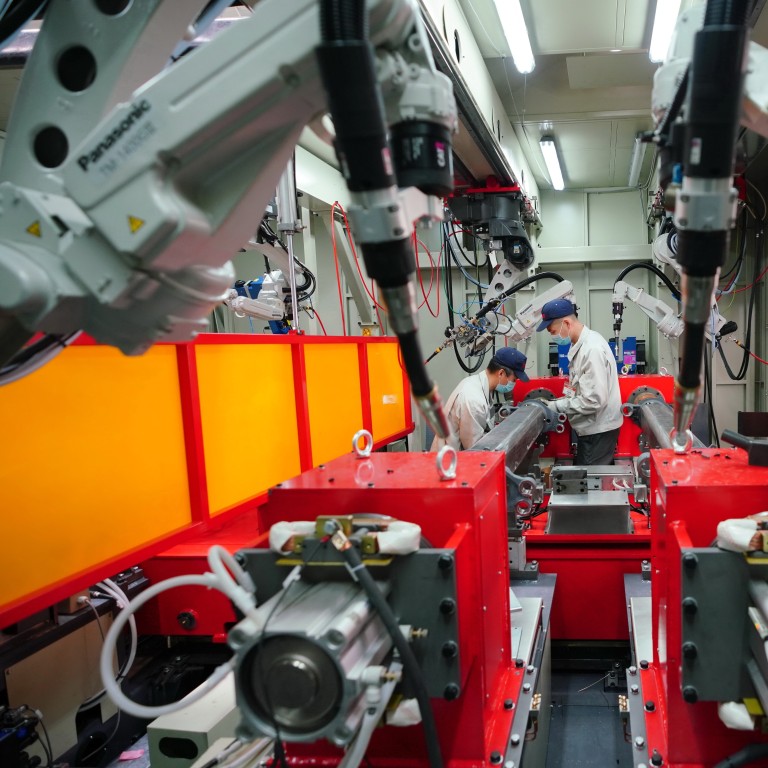
Hong Kong stocks turn in stellar June, gaining 6 per cent in the month, even as China enacts controversial security law
- June ends with a 6.4 per cent monthly gain for the Hang Seng Index
- China’s better-than-expected June PMI shows economic recovery accelerating
The Hong Kong dollar strengthened to 7.7500 per US dollar, triggering an intervention by the monetary authority as an influx of foreign funds continued to bid up the local currency’s exchange rate.
Funds attributed to mainland investors are being positioned to tap several IPOs./
Galaxy Entertainment was the top gainer on the benchmark, soaring 3.8 per cent. Other virus-stricken casino stocks rose as well as rumours swirled that China will soon begin to slowly resume its visa programme that allows mainlanders to visit the world’s top gambling hub.
The Hang Seng Index has had a roller-coaster first half of the year.
It started the year with positive sentiment, riding high after the US-China phase one trade deal sent the index up 7 per cent in December. But news in mid January of the coronavirus outbreak pommelled stocks – and led to panic selling and investors sitting on the sidelines.
Only in April did the benchmark see monthly gains, rising 4.4 per cent as traders piled back in. But that came after a near-10 per cent drop in March. Meanwhile, the overall Hong Kong market split in favour of new economy stocks that traders bet would thrive in a post-coronavirus world.
In June, sentiment improved as governments around the world eased lockdowns aimed at controlling the virus, and analysts are overall bullish on the second half of the year.
Still, the city’s benchmark has dropped more than 13 per cent this year, and remains in bear territory.
Meanwhile, the Shanghai Composite Index closed ahead Tuesday by 0.8 per cent at 2,984.67. It rose 2.4 per cent in June, and has declined 2.2 per cent this year. Kweichow Moutai, the world’s most valuable liquor company and one of the most popular stocks on the Hong Kong-China trading link, has been one of the winners, gaining nearly 24 per cent this year.
In Shenzhen, the Nasdaq-style ChiNext advanced 2.8 per cent on Tuesday to its highest level in more than four years.
Other Asia benchmarks rose as well.
Japan’s Nikkei 225 rose 1.3 per cent, South Korea’s Kospi climbed 0.7 per cent while Australia’s S&P/ASX 200 advanced 1.4 per cent.
Tuesday’s run-ups came as China’s official purchasing managers index (PMI) for June was slightly better than expected, signalling continued slow but steady recovery in the world’s second-largest economy. Both manufacturing and non-manufacturing expanded in June at a faster pace than in May, another positive sign.
“The global economy unambiguously remains in a cyclical upswing, except for pockets of weakness,” said Stephen Innes, chief global market strategist at AxiCorp. “The better-than-expected China PMI lends further weight to the argument that a global cyclical recovery is well underway that should boost global stock market sentiment.”
On Tuesday, index heavyweight Tencent rose as much as 2.9 per cent to briefly hit HK$500, but closed at HK$498.60, closing ahead by 2.6 per cent. That was the second time it has hit the milestone intraday. It did so as well last week, but, like Tuesday, it could not hold the level for the close.
Tencent has been the Hang Seng’s second-best percentage gainer in 2020, rising more than 30 per cent so far. Sino Biopharmaceutical, a leading drug maker and distributor in China, has risen the most this calendar year, advancing 31 per cent on new drug approvals and Beijing’s ongoing push to expand health care for its 1.4 billion citizens. The stock slipped 0.1 per cent on Tuesday.
Hong Kong Exchanges and Clearing, the city’s stock exchange operator, gained 3 per cent Tuesday, as investors continued to pile in as US-listed Chinese companies seek secondary listings in the city. So far this year, it has gained about 30 per cent, making it the third top percentage winner on the 50-member index.
The city’s stock market will be closed Wednesday for the Establishment Day holiday that recognises the British handover of Hong Kong to China on July 1, 1997.
In mainland China, Hainan-based companies especially free-duty operator stocks rose after Beijing revealed Monday various new measures to support building the island into a free-trade port. The maximum amount of free-duty shopping was raised to 100,000 yuan per person, and free-duty categories were also expanded, with electronic products included. China Tourism Group Duty Free Corp. soared by the daily cap of 10 per cent, as did HNA Infrastructure Investment Group.
Traders were also watching souring relations between the US and China.
The US said on Monday that it will scrap preferential treatment to Hong Kong, including previous privileges to import American defence equipment, and now the special territory, as is true of mainland China, will be required to receive a license to import dual-use technologies. That news came before the National People’s Congress Standing Committee on Tuesday unanimously passed a sweeping national security law that is the latest source of friction between the world’s two largest economies.


